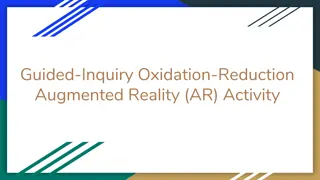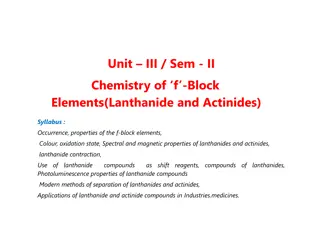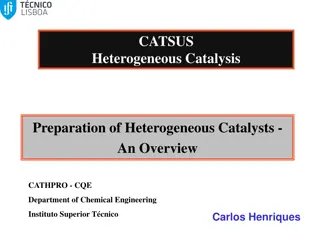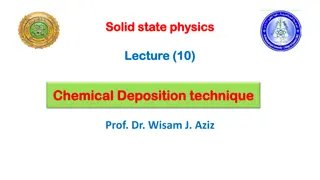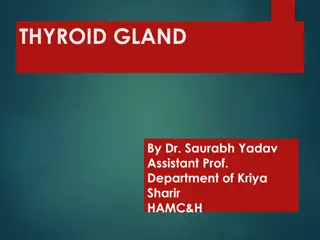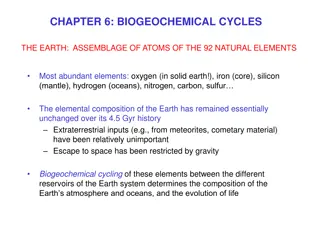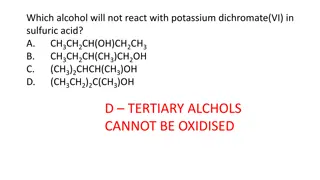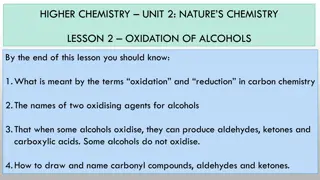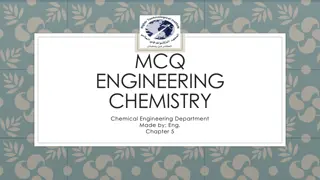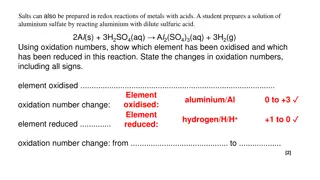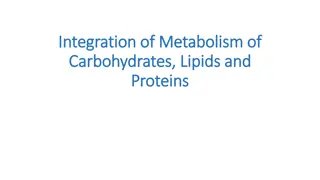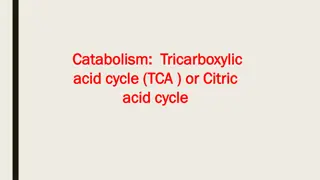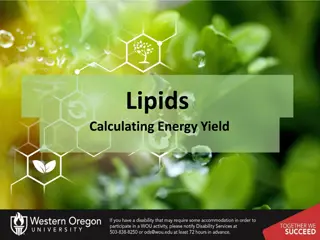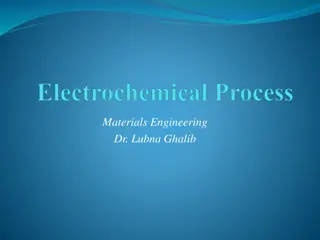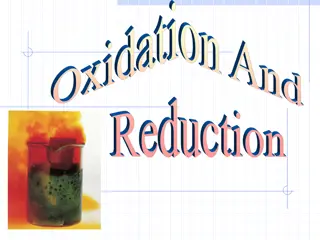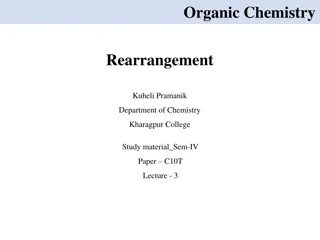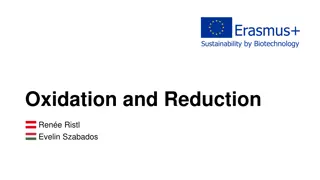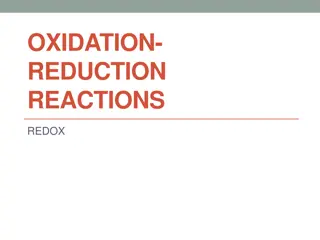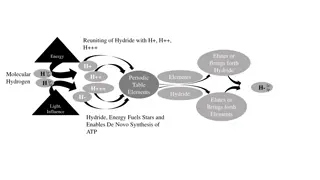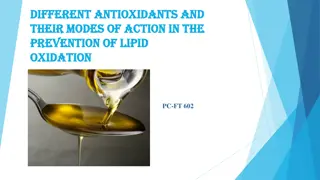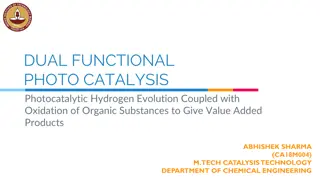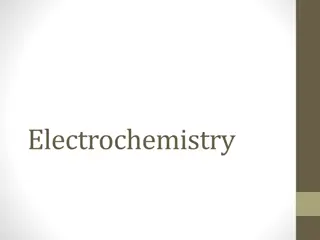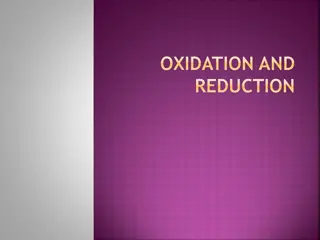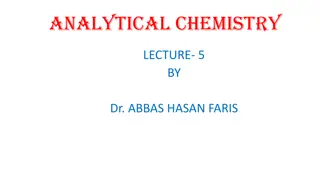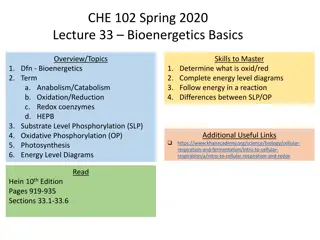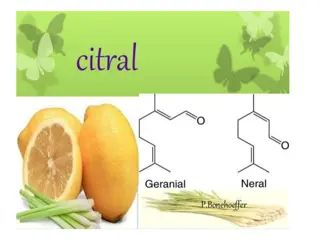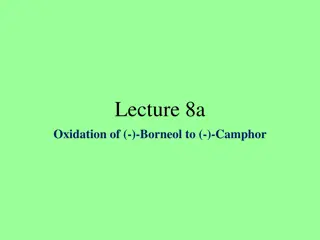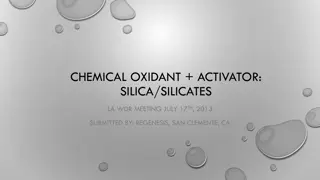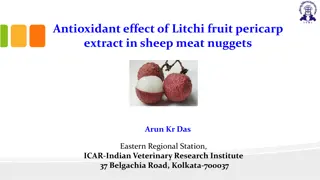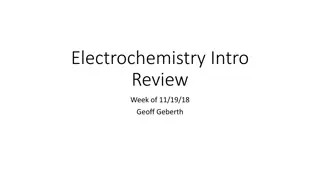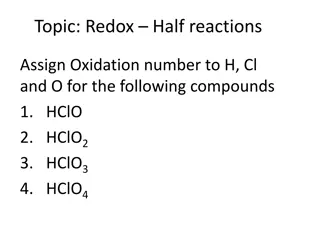Preparation of 2,3-Diphenyl quinoxaline
Quinoxaline, an organic compound, is synthesized through the condensation of benzyl with 1,2-phenylene diamine in this practical organic chemistry experiment at Salahaddin University. Quinoxaline and its derivatives have various applications in dyes, pharmaceuticals, and antibiotics. The process inv
0 views • 9 slides
Detector Building
Teams will construct a durable Oxidation Reduction Potential (ORP) probe to measure voltage and NaCl concentrations in water samples. Participants will complete a written test on the event's principles and theories. The competition involves building the device using microcontrollers, sensors, and di
2 views • 15 slides
Understanding Adrenergic Agents in Pharmaceutical Chemistry
Adrenergic agents play a crucial role in pharmacology by influencing the sympathetic nervous system through adrenergic receptors. These agents, such as sympathomimetics and sympatholytics, impact essential functions like cardiac activity, blood vessel dilation, and insulin release. Adrenergic neurot
0 views • 120 slides
Augmented Reality Oxidation-Reduction Activity Breakout Session
Engage in an interactive guided inquiry session on oxidation-reduction reactions using augmented reality technology. The session includes team tasks and discussions related to lithium-ion electric car batteries, with designated roles for each member. Participants will access Google Docs for collabor
10 views • 8 slides
Production of Radiopharmaceuticals
Radiopharmaceuticals play a crucial role in medical imaging, with a significant portion containing Tc-99m that requires chemical modification. Various Tc-labeled radiopharmaceuticals like DTPA, HIDA, MIBI, and others are used for imaging. Desirable properties of radionuclides include half-life suita
9 views • 32 slides
Overview of Glucose Metabolic Pathways in Clinical Chemistry
Explore the major metabolic pathways of glucose, including glycogenolysis, gluconeogenesis, glycolysis, and more. Understand the production, utilization, catabolic, and anabolic cycles of glucose in cellular metabolism. Learn about key concepts such as hexose interconversion, HMP/PPP, Krebs cycle, a
4 views • 29 slides
Chemistry of f-Block Elements: Lanthanide and Actinide Series Overview
This segment delves into the properties, occurrence, and unique characteristics of the f-block elements, focusing on the Lanthanide and Actinide series. Covering topics such as color, oxidation states, spectral properties, lanthanide contraction, separation methods, and industrial applications of th
1 views • 15 slides
Overview of Heterogeneous Catalysis and Catalyst Preparation
The development of catalytic processes involves research and development of new catalysts for better activity, selectivity, and stability. This study focuses on preparing new catalysts, determining their properties, and optimizing their development through structure-reactivity relationships. Catalys
5 views • 17 slides
Chemical Deposition Techniques in Solid State Physics
Chemical deposition is a fabrication technique using different chemicals for reactions, allowing coatings to form successfully. Techniques include spray pyrolysis, electrochemical deposition, dip coating, and more. Spray pyrolysis, cost-effective and versatile, is used in various commercial processe
1 views • 25 slides
Understanding the Thyroid Gland: Functions and Hormone Synthesis
The thyroid gland is a vital endocrine gland located below the larynx, responsible for producing thyroid hormones essential for regulating metabolism. This gland consists of follicles lined with follicular cells, producing thyroglobulin and thyroid hormones T3 and T4. Iodine plays a crucial role in
0 views • 40 slides
Insights into Biogeochemical Cycles and Evolutionary History of Earth
The Earth's elemental composition has remained constant over its 4.5 billion-year history, with biogeochemical cycles playing a vital role in shaping the atmosphere and oceans. The evolution of oxygen, ozone, and life on Earth is intricately linked to these cycles. Contrasting Earth and Venus, it's
0 views • 15 slides
High School Science Bowl Practice Questions
High school level Science Bowl practice questions covering multiple choice and short answer questions in Biology, Chemistry, Physics, and General Science. Topics include biological terms, chemical reactions, oxidation numbers, electromotive force, and data interpretation on line graphs.
0 views • 100 slides
Organic Chemistry Reactions Overview
This content covers various aspects of organic chemistry reactions, including the oxidation of alcohols with potassium dichromate, the solubility of molecules in water, and the oxidation of propan-1-ol to form aldehydes or carboxylic acids. It also explores the oxidation of butan-2-ol and the suitab
0 views • 9 slides
Understanding Oxidation of Alcohols in Carbon Chemistry
Oxidation of alcohols involves either adding oxygen or removing hydrogen in carbon compounds, leading to the production of aldehydes, ketones, and carboxylic acids. Primary alcohols can oxidize further to produce aldehydes and carboxylic acids, while secondary alcohols form ketones. Tertiary alcohol
1 views • 13 slides
Corrosion Prevention Methods in Chemical Engineering
Define oxidation, reduction, oxidizing agent, reducing agent, standard electrode potential, Nernst equation, and corrosion in the context of chemical engineering. Discuss different forms of corrosion, including uniform corrosion, galvanic corrosion, pitting corrosion, and stress corrosion. Explore m
0 views • 20 slides
Understanding Redox Reactions in Chemistry
Salts can be prepared through redox reactions involving metals and acids. This interactive lesson covers oxidation numbers, identifying oxidized and reduced elements, and explaining electron transfer in redox reactions. Examples include reactions of aluminum with sulfuric acid and magnesium with cop
2 views • 12 slides
Understanding the Integration of Carbohydrate, Lipid, and Protein Metabolism
The integration of metabolism involving carbohydrates, lipids, and proteins can be divided into three stages: hydrolysis to simpler units, preparatory stage, and oxidative stage. In the hydrolysis stage, complex polysaccharides, lipids, and proteins are broken down to simpler forms. The preparatory
3 views • 13 slides
Overview of Cellular Respiration Pathways and ATP Generation
Cellular respiration involves key processes like the Tricarboxylic Acid Cycle (TCA), Electron Transport Chain, and ATP generation pathways. The TCA cycle utilizes Acetyl-CoA to produce energy-rich molecules, while the Electron Transport Chain facilitates ATP synthesis through oxidative phosphorylati
0 views • 18 slides
Energy Yield from Lipid Oxidation Process
Understanding the energy generation process from lipid oxidation involves the conversion of fatty acids into Acetyl-CoA through multiple rounds of oxidation, which then enter the Krebs cycle to produce ATP. Each round of oxidation results in the production of Acetyl-CoA, NADH, FADH2, and net gains o
0 views • 7 slides
Understanding Electrochemical Processes in Materials Engineering
Electrochemical processes play a crucial role in materials engineering, specifically in the context of corrosion. These processes involve both oxidation (anodic reaction) and reduction (cathodic reaction) reactions occurring simultaneously. Maintaining a balance between these reactions is essential
3 views • 22 slides
Understanding Oxidation Numbers in Chemistry
Oxidation is a process where atoms or ions gain a more positive oxidation state, while reduction involves attaining a more negative oxidation state. This informative content explains oxidation numbers, uncombined elements, monoatomic ions, and oxidation rules in compounds. Practice determining oxida
5 views • 5 slides
Baeyer-Villiger Oxidation: Mechanism and Migration Aptitude
The Baeyer-Villiger oxidation is a key organic reaction that transforms ketones into esters or cyclic ketones into lactones using peroxyacids. The mechanism involves protonation of the carbonyl group and migration of substituents. Migration aptitude in this reaction determines the regioselectivity,
0 views • 10 slides
Understanding Oxidation and Reduction in Biotechnology through Erasmus+ Sustainability
Explore the concept of oxidation and reduction in biotechnology with the help of Erasmus+ Sustainability, discussing electron donation, electron acceptance, oxidation numbers, and calculation examples. Learn how these processes work together for sustainable biotechnological applications.
0 views • 5 slides
Understanding Alcohol Oxidation in Organic Chemistry
Explore the oxidation of alcohols in organic chemistry through a series of experiments involving primary, secondary, and tertiary alcohols. Learn how different alcohols react and identify the products of oxidation reactions. Understand the distinctions between aldehydes, ketones, and the classificat
0 views • 31 slides
Understanding Oxidation-Reduction Reactions in Chemistry
Explore the concept of oxidation and reduction in chemistry, which are fundamental processes that occur simultaneously in oxidation-reduction reactions. Learn about the role of oxygen, different types of oxidation reactions beyond burning, such as bleaching stains, and the concept of reduction invol
0 views • 34 slides
The Intricate Pathways of Choline Synthesis and Oxidation in Molecular Biology
Delve into the complex processes of choline synthesis and oxidation pathways, involving the integration of hydride ions and various molecules, essential for the production of phosphatidylcholine and other crucial compounds in biological systems. Learn about the enzymes and mechanisms that drive the
1 views • 11 slides
Understanding Antioxidants and Their Role in Preventing Lipid Oxidation
Lipid oxidation is a crucial chemical process affecting the quality of fats and oils, leading to off-flavors and toxicity. Antioxidants play a vital role in delaying this oxidation process by scavenging free radicals through mechanisms like free radical scavenging. They help prolong the shelf life a
0 views • 12 slides
Understanding Biological Oxidation-Reduction Reactions and Coenzymes
Explore the fascinating world of biological oxidation-reduction reactions catalyzed by oxidoreductases. Coenzymes play a crucial role in these processes, facilitating the transfer of hydrogen atoms. NAD+ is a well-known coenzyme involved in accepting and donating hydrogen. Witness the oxidation of e
0 views • 13 slides
Understanding Fatty Acid Oxidation in Zoology Department with Miss Punam Patil
Explore the process of fatty acid oxidation in zoology, including the entry of fatty acids into mitochondria, TCA cycle outcomes, and differences between mitochondrial and peroxisomal oxidation. Learn about the oxidation of saturated, monounsaturated, and polyunsaturated fatty acids through detailed
0 views • 9 slides
Dual-Functional Photo Catalysis: Hydrogen Evolution & Organic Oxidation
The research explores dual-functional photo catalysis, combining hydrogen evolution with the oxidation of organic substances to produce value-added products. It focuses on utilizing photoelectricity to create electrons for hydrogen production and organic molecule oxidation. The study investigates th
0 views • 14 slides
Understanding Electrochemistry Concepts and Redox Reactions
Explore the fundamentals of electrochemistry, oxidation-reduction reactions, and identification of redox components. Learn about oxidation states, electron transfer, and half-reactions. Dive into examples and visual aids to grasp the concepts easily.
0 views • 42 slides
Understanding Oxidation and Reduction Reactions in Chemistry
Dive into the world of oxidation and reduction reactions through displacement reactions and ionic equations. Explore how atoms turn into ions, learn about spectator ions, balance electrons in half equations, and grasp the definitions of oxidation and reduction (OILRIG). Discover which elements are o
0 views • 11 slides
Understanding Oxidation-Reduction Reactions in Analytical Chemistry
Oxidation-reduction reactions play a crucial role in various chemical processes, including photosynthesis and corrosion. This content delves into the basics of redox reactions, explaining how electrons are transferred between reactants, leading to changes in oxidation numbers. Examples such as the r
0 views • 10 slides
Bioenergetics Basics: Overview, Topics & Energy Diagrams
The content covers the fundamentals of bioenergetics, including topics like anabolism, catabolism, oxidation, reduction, redox coenzymes, substrate-level phosphorylation, oxidative phosphorylation, and photosynthesis. It also explores energy level diagrams, metabolism, oxidation-reduction reactions,
0 views • 21 slides
Citral Oxidation and Reduction Reactions in Organic Chemistry
The oxidation of citral with moist Ag2O yields geranic acid with the same number of carbon atoms. On the other hand, reduction of citral with Na-amalgam in dilute acid results in the formation of a primary alcohol. These reactions showcase important transformations in organic chemistry, specifically
0 views • 12 slides
Oxidation of (-)-Borneol to (-)-Camphor: Experimental Procedure
The experiment details the oxidation of (-)-borneol to (-)-camphor using hypochlorous acid, along with purification steps. It involves the use of household bleach solution and various testing methods to ensure successful conversion. The process includes handling small amounts of reagents, monitoring
0 views • 12 slides
Environmental Remediation Using Silica/Silicates for Contaminant Oxidation
Utilizing silica and silicates as chemical oxidants in environmental remediation has been approved under the general WDR permit since 2010. With over 1,500 applications in the US and Canada, including 148 in California, these substances are known for their safety and effectiveness in contaminant oxi
0 views • 8 slides
Utilizing Litchi Fruit Pericarp Extract as a Natural Antioxidant in Meat Products
Oxidation is a major concern in meat products affecting quality and shelf life. This study explores the potential of litchi fruit pericarp extract as a natural antioxidant in sheep meat nuggets to combat lipid oxidation. Litchi fruit pericarp, often discarded as waste, is rich in phenolics with anti
0 views • 17 slides
Understanding Electrochemistry: A Comprehensive Overview
Dive into the world of electrochemistry with this detailed review covering topics such as oxidation, reduction, half-reactions, and the significance of oxidation numbers in balancing redox equations. Explore key concepts like OIL RIG (Oxidation Is Loss, Reduction Is Gain) and learn how to apply elec
0 views • 17 slides
Understanding Redox Half Reactions: Assigning Oxidation Numbers and Half-Reactions
In this content, we explore assigning oxidation numbers to elements in compounds such as HClO, HClO2, HClO3, and HClO4. We then delve into the Haber Process to understand redox reactions. The concept of oxidation and reduction, as well as the significance of electrons in these reactions, is illustra
0 views • 20 slides



